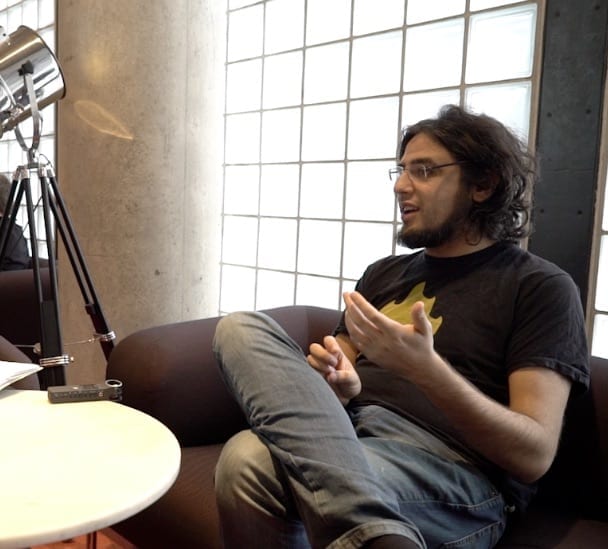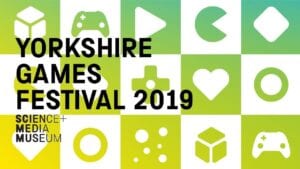When it comes to independent video games it’s hard to find someone with more experience in the field than Rami Ismail.
Rami Ismail, if you didn’t know, is “the Business and Development Guy” at Dutch game studio, Vlambeer.
Vlambeer, known for Serious Sam: The Random Encounter, GUN GODZ and Nuclear Throne, is one of the most prolific indie studios in the business right now, and Ismail sat down with GameByte at Yorkshire Games Festival 2019 to talk about the role of indie games in the industry.



It’s been a surprising few years for indie gaming, with the likes of Cuphead, Journey, Dead Cells and dozens more turning gamers’ interest towards smaller studios.
One of the reasons for the increase of the popularity in indie games is the Nintendo Switch, which currently has hundreds of indie titles you can play on the go.
“Indie games are the vanguard [of gaming],” Ismail tells me. “And when a new platform is launched that’s where the developers go because, on a relatively tight budget and a restrained timeline, you can create something that shows off the power of the console…
“I have [a Switch] right here,” says Ismail. “The Switch has been interesting. I think the fascinating thing about indie games is we’re a little bit more capable of adapting to new and interesting platforms.



“The Switch is a prime example of that. Here you have this reimagined form of play, easy access to multiplayer, access to party play… a device to use home or on the road and immediately you see indies trying to lean into that, [asking] ‘what can we make that’s unique as a Switch game?’
“When a new platform launches that’s one of the first movements you see. I think a lot of AAA sort of watches for that…we’re kind of like the canary in the coal mine. We try, and once the player sees it’s safe, [AAA games] can take the risk as well. The Switch is doing a tremendous job. I love having a portable indie machine that I can take with me. It’s amazing.”



Ismail is a huge advocate for diversity in gaming, an industry where its lack of diversity is frequently a talking point. For Ismail, it’s something that needs to change.
“I was raised between two cultures – I’m half Dutch and half Egyptian – and though when I was younger it didn’t bother me, when I started to grow up I realised in the games I played, I’d always play as someone who looked like my Dutch friends, trying to be the people who looked like my Egyptian friends,” he said.
“It was always the same story, the good guys are white and the bad guys are anything else. Whether that’s purple aliens or brown humans or they spoke Russian or they were Nazis, whatever it was, [it was] always something that made them different from a ‘normal good white person.’ And it started bothering me. I realised that games as a medium are far too valuable to be restrained to such a small group of creators.
“We have a global language [in gaming] and we should use it, but we should allow everyone to speak.
“I want to see games from everybody, about everything, and the only way to do that is to make this industry as open and as inclusive as possible.”
Gaming is getting more inclusive, but it’s a slow process as the industry gets bigger and bigger. More and more people are now able to get the access they need to be able to create their own games, whether that’s achieved through building in Minecraft or learning the basics of Unreal.



Long gone are the days where game creation was looked down on. It’s now something that’s regularly encouraged in schools, and many of the guests at the festival are young students looking to get into the industry. So how will this influx of future game makers affect the indie market?
“It’s going to be super oversaturated and that’s weirdly really exciting to me,” says Ismail. “I believe that structures are created out of necessity…when someone needs a thing to happen, that’s why It happens.
“The indie space being over-saturated – especially with a space that’s as creative and as stubborn as indie game development – means that they will create this space.
“Steam being oversaturated has led to the creation of ich.io, to GOG, to freeware, to doing Patreons, Kickstarters. All of these structures are outside of what we see as traditional – I think that’s very exciting…
“Tools like Unity, Unreal, GameMaker, Dreams [PS4] …all of these new tools empower different people to make games. The audience for Twine is going to be very different to the audience for Dreams, which is going to be very different to the audience from Unreal. The way they spread those games is going to be different as well.



“I think the oversaturation is actually forcing fragmentation. Fragmentation is going to be the healthiest thing for indie games right now… We need the space to diversify, and the way to diversify is to let every pocket create its own heroes, its own structures. Bring the oversaturation!”
A big thanks to Rami Ismail for speaking to us. Check out everything he’s up to over on Twitter right here.
GameByte is the official media partner of Yorkshire Games Festival.
